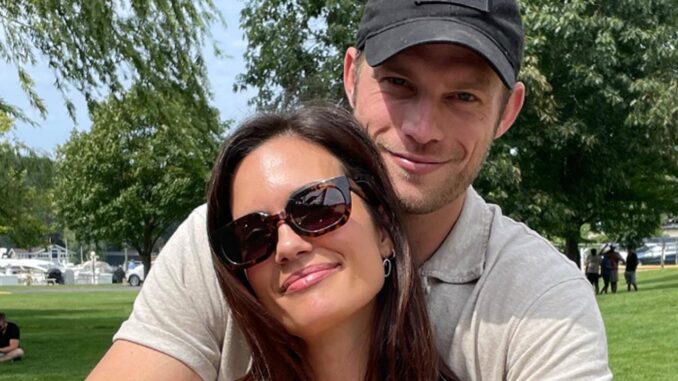
The internet, that insatiable collector of crumbs and curator of celebrity lore, often thrives on the spectacular. Divorces are splashed, romances ignited, and scandals unfurl with dramatic flair. But sometimes, a quiet remark, a single, reflective phrase, can carry more weight than a thousand headlines. Such was the case when Torrey DeVitto, a familiar face from screens like The Vampire Diaries and Chicago Med, offered a rare comment about her past marriage to fellow actor Paul Wesley: “We were young and wild.”
This isn’t merely gossip; it’s a keyhole view into a universal human experience, framed by the unique pressures of the public eye. For those who followed The Vampire Diaries, DeVitto and Wesley’s relationship was a real-life romance mirroring the fervent on-screen passion of their characters. They met on a film set, married quietly in 2011, and for a time, represented an idealized tableau of co-star love, cherished by a devoted fandom. Their eventual divorce in 2013 was met with the usual public interest, but DeVitto herself largely maintained a dignified silence, navigating the aftermath with admirable privacy. Which is precisely why her recent, understated comment holds such resonant power.
“We were young and wild.” The phrase hangs in the air, a whisper in a world of shouts. It’s not an accusation, nor is it a lament. Instead, it’s an observation steeped in the gentle wisdom of hindsight, a quiet acknowledgment of a particular season in life. It speaks volumes about the nature of growth, the evolution of self, and the often-turbulent journey of young love.
What does “young and wild” truly signify when spoken by someone reflecting on a past marriage? It evokes a time of unfettered spirit, of decisions made with more heart than head, of passion that burns incandescent, sometimes volatile, before the steady flame of self-knowledge fully ignites. It suggests a love that blossomed amidst the heady rush of burgeoning careers, the whirlwind of fame, and the raw, unpolished edges of two individuals still very much discovering who they were, both independently and together.
To be “young and wild” in love is to be less burdened by the gravity of future-planning and more propelled by the immediacy of emotion. It’s building a life together before the foundational stones of individual identity are fully set. It’s the kind of love that feels epic and all-consuming, perhaps precisely because it’s not yet tempered by the hard-won wisdom that comes with age, experience, and the inevitable bumps and bruises of adulting. It’s a love that, while genuine and deeply felt, may not possess the intrinsic resilience or the aligned long-term visions required to weather every storm.
DeVitto’s comment, years later, isn’t about casting blame or expressing regret. It’s a testament to the fact that not all loves are meant to last forever, but all loves serve a purpose. They are chapters in the grand novel of our lives, each contributing to the person we become. The “wildness” of youth, with its impetuousness and intensity, can forge bonds that feel unbreakable in the moment, only to reveal their delicate nature under the scrutiny of evolving selves.
For many of us, Torrey DeVitto’s succinct reflection echoes in the chambers of our own memories. Who among us doesn’t have a “young and wild” chapter in our romantic history? A love that was passionate and consuming, perhaps ultimately unsustainable, but undeniably formative. A relationship that taught us invaluable lessons about ourselves, about compromise, about what we truly need and desire in a partner, even if the primary lesson was simply that we weren’t quite ready for forever.
Her comment is an act of grace. It honors the past without clinging to it. It acknowledges the validity of a relationship that ultimately ran its course, transforming it from a “failed marriage” into a vital period of shared experience and personal growth. It allows for the tenderness of memory while firmly asserting the reality of present-day maturity.
In a world that often demands dramatic narratives, Torrey DeVitto’s quiet observation about her past marriage offers a more profound insight. It reminds us that love, in all its forms, is a living thing, changing, adapting, and sometimes, simply reaching its natural conclusion. “We were young and wild” isn’t a post-mortem; it’s a poignant melody played on the strings of memory, a gentle and knowing nod to the beautiful, messy, and utterly essential journey of becoming who we are, one youthful, wild, and ultimately wise, love at a time.
